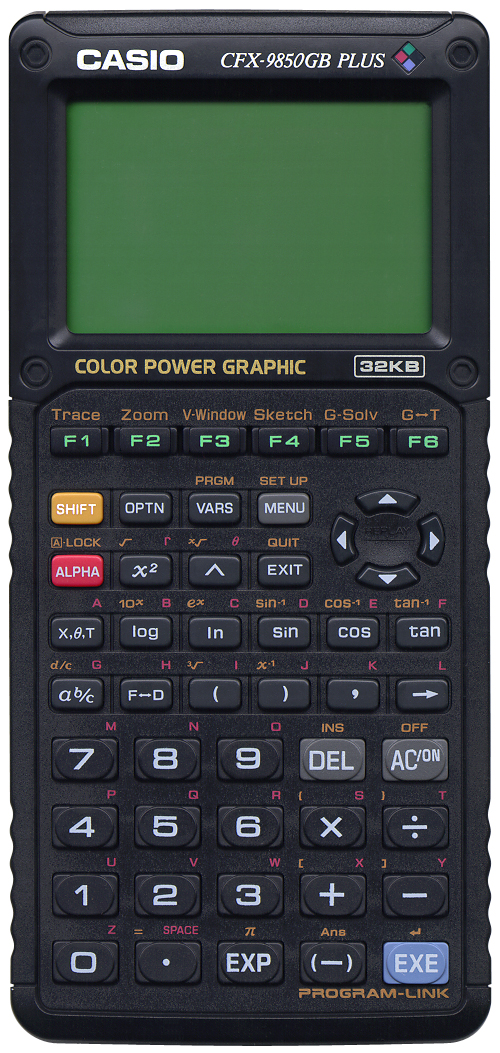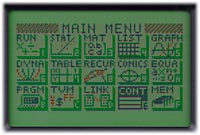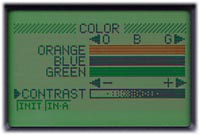
Terminated: unknown
This calculator is very much like the other high-end CASIO calculator in my collection, the CASIO fx-9700GE. However, there must have been models in between.
There are more models in the 9850 series. I’ve seen references to:
- CASIO CFX-9850G
- CASIO CFX-9850G PLUS
- CASIO CFX-9850GB
- CASIO CFV-9850GB PLUS (this one)
 The CASIO CFX-9850GB PLUS has a colour display (see the calculator’s
Icon Menu to the right). I’m not sure if the 9850 is the first CASIO
with a colour display or not. The colour display has some advantages and
some disadvantages. It’s really great with multiple graphs, but the
readability of the screen is not as good as you’d get with regular
LCD’s. When used with plotting functions, each function can be set to
one of the three available colours, blue, orange or green. The Icon Menu
is really nice. Not a chance of getting lost on this calculator.
The CASIO CFX-9850GB PLUS has a colour display (see the calculator’s
Icon Menu to the right). I’m not sure if the 9850 is the first CASIO
with a colour display or not. The colour display has some advantages and
some disadvantages. It’s really great with multiple graphs, but the
readability of the screen is not as good as you’d get with regular
LCD’s. When used with plotting functions, each function can be set to
one of the three available colours, blue, orange or green. The Icon Menu
is really nice. Not a chance of getting lost on this calculator.
 The screen colours can be adjusted on a per-colour basis, as can be seen
on the screen dump to the right here. I reckon the LCD dot’s colours are
changed by adjusting the driving voltage or maybe the frequency. I don’t
think there’s more than one display layer.
The screen colours can be adjusted on a per-colour basis, as can be seen
on the screen dump to the right here. I reckon the LCD dot’s colours are
changed by adjusting the driving voltage or maybe the frequency. I don’t
think there’s more than one display layer.
Hello Ernst,
Great web site. I found it through researching CASIO color calculator LCDs.
Just FYI- For many years (since the first CASIO color data bank, which I bought ~1994) I had believed these LCDs have 2 layers. Lending credence to this is an apparent "parallax difference" visible at the border between two color areas, e.g. orange and blue...
However - It transpires that these LCDs are in fact regular single-layer TN devices. The different colors are obtained by PWMing the drive signal. It’s an interesting idea, and apparently nobody besides CASIO has used this technique (maybe they patented it). The magic is not in the LCD itself, but in the driver IC - and these types of drivers appear to be CASIO ASICs, not available off-the-shelf.
When compared to the earlier CASIO fx-9700GE I have to say this calculator’s keyboard layout is much better. Functionally I can’t see any fundamental differences. Take a look at that calculator’s page for some of this calculator’s features.
New however are the financial functions, no need to buy a separate special financial calculator anymore.
The case is quite ugly IMHO, but the protective cover is much better and can not really damage the display anymore. Thanks, CASIO!